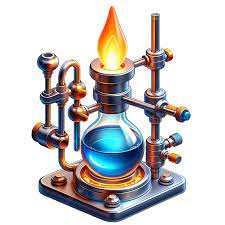Technology Title
AI in Chemical Synthesis-oct05
AI in Chemical Synthesis-oct05
Project Title
ChemAI: AI-Powered Molecular Design and Synthesis
ChemAI: AI-Powered Molecular Design and Synthesis
Category
Chemistry
Chemistry
Authors
suresha3@yopmail.com
suresha3@yopmail.com
Short Description
ChemAI" is a project that leverages AI and machine learning algorithms to design and optimize chemical synthesis pathways, predicting the properties and behavior of molecules, and accelerating the dis
ChemAI" is a project that leverages AI and machine learning algorithms to design and optimize chemical synthesis pathways, predicting the properties and behavior of molecules, and accelerating the dis
Long Description
ChemAI is an innovative project that harnesses the power of artificial intelligence (AI) and machine learning (ML) algorithms to revolutionize the field of chemical synthesis. By integrating AI and ML, ChemAI aims to design and optimize chemical synthesis pathways, predict the properties and behavior of molecules, and significantly accelerate the discovery process.At its core, ChemAI utilizes advanced ML models, such as graph neural networks (GNNs) and transformer architectures, to analyze and learn from vast amounts of chemical data. These models enable the prediction of molecular properties, including reactivity, stability, and solubility, which are crucial in determining the feasibility of chemical synthesis pathways.ChemAI's AI-driven approach allows for the rapid exploration of vast chemical spaces, identifying optimal synthesis routes and predicting potential reaction outcomes. By leveraging techniques such as reinforcement learning and Bayesian optimization, ChemAI can iteratively refine its predictions and adapt to new data, ensuring the accuracy and reliability of its results.The project's technical framework consists of several key components, including data curation and preprocessing, model training and validation, and synthesis planning and optimization. ChemAI's data pipeline involves the collection and processing of large datasets from various sources, including scientific literature, databases, and experimental results. The project's ML models are trained and validated using these datasets, enabling the prediction of molecular properties and synthesis outcomes. Overall, ChemAI has the potential to transform the field of chemical synthesis, enabling researchers to design and optimize complex molecules with unprecedented speed and accuracy.
ChemAI is an innovative project that harnesses the power of artificial intelligence (AI) and machine learning (ML) algorithms to revolutionize the field of chemical synthesis. By integrating AI and ML, ChemAI aims to design and optimize chemical synthesis pathways, predict the properties and behavior of molecules, and significantly accelerate the discovery process.At its core, ChemAI utilizes advanced ML models, such as graph neural networks (GNNs) and transformer architectures, to analyze and learn from vast amounts of chemical data. These models enable the prediction of molecular properties, including reactivity, stability, and solubility, which are crucial in determining the feasibility of chemical synthesis pathways.ChemAI's AI-driven approach allows for the rapid exploration of vast chemical spaces, identifying optimal synthesis routes and predicting potential reaction outcomes. By leveraging techniques such as reinforcement learning and Bayesian optimization, ChemAI can iteratively refine its predictions and adapt to new data, ensuring the accuracy and reliability of its results.The project's technical framework consists of several key components, including data curation and preprocessing, model training and validation, and synthesis planning and optimization. ChemAI's data pipeline involves the collection and processing of large datasets from various sources, including scientific literature, databases, and experimental results. The project's ML models are trained and validated using these datasets, enabling the prediction of molecular properties and synthesis outcomes. Overall, ChemAI has the potential to transform the field of chemical synthesis, enabling researchers to design and optimize complex molecules with unprecedented speed and accuracy.
Potential Applications
Drug discovery and development: ChemAI can aid in the design of new medicines by predicting the properties and behavior of molecules, identifying potential lead compounds, and optimizing synthesis pathways, ultimately accelerating the discovery of new treatments for various diseases.
Materials science and nanotechnology: By predicting the properties of molecules and materials, ChemAI can help design and optimize new materials with specific properties, such as conductivity, strength, or optical properties, leading to breakthroughs in fields like energy storage, electronics, and renewable energy.
Catalysis and energy applications: ChemAI can optimize the design of catalysts and predict their performance, leading to more efficient and sustainable energy conversion processes, such as fuel cells, batteries, and biofuels.
Environmental remediation: ChemAI can help design and optimize molecules for environmental remediation, such as pollutants degradation, water treatment, and soil cleanup, reducing the environmental impact of human activities.
Agrochemicals and crop protection: ChemAI can aid in the design of new agrochemicals, such as pesticides and fertilizers, with improved efficacy, selectivity, and environmental safety, leading to more sustainable agricultural practices.
Synthetic biology and biotechnology: ChemAI can help design and optimize biological pathways, predicting the behavior of biological systems, and accelerating the development of new biological products, such as biofuels, bioproducts, and pharmaceuticals.
Drug discovery and development: ChemAI can aid in the design of new medicines by predicting the properties and behavior of molecules, identifying potential lead compounds, and optimizing synthesis pathways, ultimately accelerating the discovery of new treatments for various diseases.
Materials science and nanotechnology: By predicting the properties of molecules and materials, ChemAI can help design and optimize new materials with specific properties, such as conductivity, strength, or optical properties, leading to breakthroughs in fields like energy storage, electronics, and renewable energy.
Catalysis and energy applications: ChemAI can optimize the design of catalysts and predict their performance, leading to more efficient and sustainable energy conversion processes, such as fuel cells, batteries, and biofuels.
Environmental remediation: ChemAI can help design and optimize molecules for environmental remediation, such as pollutants degradation, water treatment, and soil cleanup, reducing the environmental impact of human activities.
Agrochemicals and crop protection: ChemAI can aid in the design of new agrochemicals, such as pesticides and fertilizers, with improved efficacy, selectivity, and environmental safety, leading to more sustainable agricultural practices.
Synthetic biology and biotechnology: ChemAI can help design and optimize biological pathways, predicting the behavior of biological systems, and accelerating the development of new biological products, such as biofuels, bioproducts, and pharmaceuticals.
Image


Keywords
Proposal
Proposal
Email
suresha3@yopmail.com
suresha3@yopmail.com